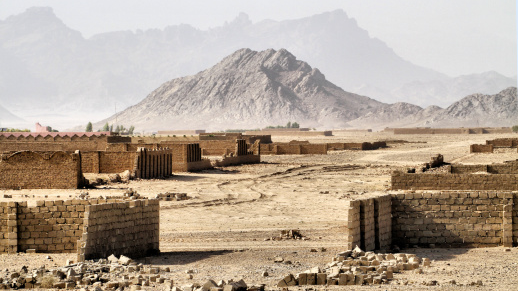
Deserted village in Kandahar Province, Afghanistan. /Getty
Deserted village in Kandahar Province, Afghanistan. /Getty
Editor's note: Muhammad Asif Noor is founder of the Friends of BRI Forum, a Pakistan-based think tank. The article reflects the author's opinions and not necessarily the views of CGTN.
Afghanistan has been embroiled in a prolonged conflict for the last two decades. China's recent policy development highlights its position as a global leader committed to providing stability and assistance in humanitarian crises. China has taken on a leadership role in promoting global peace and has extended its efforts towards peace-building in Afghanistan.
Despite its status as an external actor, China has remained unwavering in its determination to address the challenges faced by the ordinary people of Afghanistan. China's unequivocal support for the principles of religious freedom, tolerance, and national customs of Afghanistan underscores its commitment to promoting peace and stability in the region and beyond. It is evident that China's contribution towards peace-building in Afghanistan is of considerable significance.
To deal with the delicate and complex situation in and about Afghanistan, China has a set of fundamental principles that guide its actions in Afghanistan, with three principles that it affirms and three that it rejects. Firstly, China affirms Afghanistan's independence, sovereignty, and territorial integrity, recognizing the importance of these values for the region's stability.
Secondly, China refrains from interfering in Afghanistan's internal affairs, recognizing the need to respect the country's sovereignty and avoid seeking areas of influence or manipulating its people. Thirdly, China asserts its commitment to a morally high perspective that views the problems faced by Afghanistan as its own. Despite being an external actor, China remains deeply concerned about Afghanistan's challenges, including terrorism, humanitarian crisis, and instability. By affirming these principles, China hopes to contribute positively to peace-building in Afghanistan.
One of the most significant challenges facing China in Afghanistan is the issue of security, which requires a collaborative effort to overcome. The East Turkestan Islamic Movement (ETIM) poses a significant security threat to China, and the group operates within Afghanistan. China has expressed its concerns over the presence of internationally banned outfits in Afghanistan and expects the Afghan government to ensure the safety and security of all stakeholders, including China.
To counter terrorism, China has offered both multilateral and bilateral cooperation to the Afghan interim government. It is worth noting that the people of Afghanistan face serious threats from a multitude of terrorist groups, and remnants of al-Qaeda. Despite the ongoing efforts of Afghan forces to establish the state's writ and eliminate the terrorist footprint from Afghanistan, they continue to face resource shortages.
By promoting moderate governance in Afghanistan, China seeks to play a constructive role in ensuring peace and stability in the region, particularly in light of the challenges posed by extremist groups and other sources of instability. In this regard, China's policy supports "moderate" and "prudent" governance in Afghanistan by advocating for an open and inclusive political structure, moderate domestic and foreign policies, and friendly exchanges with all countries, particularly its neighboring nations.
China emphasizes the importance of the Afghan Interim Government safeguarding the fundamental rights and interests of all its citizens, including women, children, and members of all ethnic groups. Additionally, China hopes that the Afghan government will actively work towards meeting the needs of the Afghan people and meeting the expectations of the international community.

Anti-epidemic supplies from China during the handover ceremony at Hamid Karzai International Airport in Kabul, Afghanistan, October 8, 2020. /Xinhua
Anti-epidemic supplies from China during the handover ceremony at Hamid Karzai International Airport in Kabul, Afghanistan, October 8, 2020. /Xinhua
It is worth mentioning that Afghanistan has observer status at the Shanghai Cooperation Organization (SCO), where China leads security, political and economic frameworks in the region. This organization strives to eradicate three evils, i.e., terrorism, separatism, and extremism, in the region, as all evils exist in Afghanistan. In extension, China calls on the international community to take radical measures that can cut the roots of terrorism and extremism.
The foremost need of Afghanistan amid these challenges is the availability of financial and technical resources. The unilateral sanctions and a specific ban on overseas economic assets of Afghanistan by the U.S. are real hindrances in the capacity building of Afghanistan. Since the U.S. and the Islamic Emirates of Afghanistan are bound by Doha Agreement to cooperate on counter-terrorism officials, the U.S. should not expect unilateral progress from the Taliban. In addition to terrorism, these sanctions have been aggravating the humanitarian crisis in Afghanistan.
On the contrary, the U.S. has left the region, but China and other neighbors of Afghanistan remain at receiving end of terrorism in the area. China cannot unilaterally deal with Afghanistan and has always worked on building regional support to assist the country. China believes in the democratic transformation of Afghanistan and the introduction of moderate policies leading toward sustainable peace and stability. If all the stakeholders can come forward to enable a conducive environment for peace and stability in Afghanistan, China can be a trusted partner for the future of Afghanistan.
China has been steadfast in its support of Afghanistan out of goodwill. China did not close its embassy in Afghanistan when the Taliban took over Kabul and continued to open the dialogue with Afghan Taliban. China was also amongst the first countries which announced investments in Afghanistan and offered humanitarian assistance, especially during the harsh winters. There cannot be any alternative to development and counter-terrorism for Afghanistan, and there can be no reliable partner than China.
(If you want to contribute and have specific expertise, please contact us at opinions@cgtn.com. Follow @thouse_opinions on Twitter to discover the latest commentaries in the CGTN Opinion Section.)